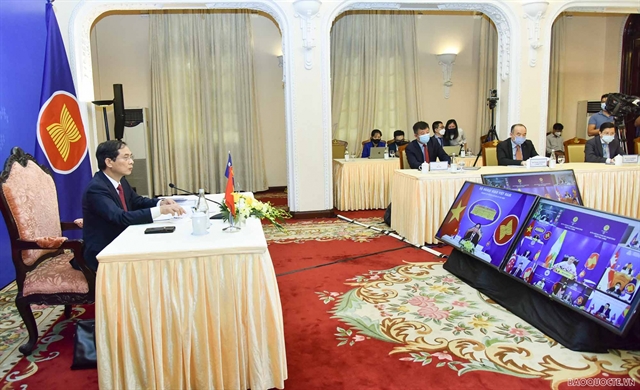
HÀ NỘI — Foreign ministers of the 10 ASEAN member countries, including Vietnamese Foreign Minister Bùi Thanh Sơn, convened virtually on Monday, for the 54th ASEAN Foreign Ministers’ Meeting (AFMM) to discuss a range of topics including the bloc’s post-pandemic recovery, the South China Sea (known in Việt Nam as East Sea) and the community building process.
Participants discussed the ‘three pillars’ that form the foundation of ASEAN. These include political security, economic security and the socio-cultural values of the community.
Attendees lauded the successful progress made in all three areas in 2021, particularly given the impact of the COVID-19 pandemic.
They welcomed new ideas such as the Strategic and Holistic Initiative to Link ASEAN Responses to Emergencies and Disasters (ASEAN SHIELD) and the Consolidated Strategy on the Fourth Industrial Revolution (4IR).
The ministers also emphasised the importance of activities to raise the awareness and identity of the ASEAN Community. This included promoting solidarity, support, security, and sharing among countries in the bloc while at the same time enhancing resilience, proactiveness and effectiveness in addressing various challenges.
The ministers pledged to review the implementation of the ASEAN Charter, and develop a post-2025 Vision of the ASEAN Community and to promote sub-regional cooperation. Countries welcomed Việt Nam’s offer to organise a sub-regional cooperation forum by the end of this year.
The response to the pandemic and post-pandemic recovery was also highlighted.
The ministers emphasised the need to cooperate in response to the pandemic, especially regarding vaccines. The bloc needs to share their experiences, and research on the development, production and distribution of vaccines, they agreed.
Contributions to the COVID-19 ASEAN Response Fund were also mentioned with participant countries requesting the urgent implementation of the Action Plan for the ASEAN Vaccine Security and Self-Reliance, the ASEAN Regional Reserve of Medical Supplies, and the ASEAN Comprehensive Recovery Framework.
Regarding ASEAN’s external relations, the ministers agreed to establish a dialogue partnership with the United Kingdom and a Sectoral Dialogue Partnership with Brazil.
The delegates also welcomed and approved the proposal to join the Treaty of Amity and Cooperation (TAC) by the Netherlands, Greece, Qatar, the United Arab Emirates, Oman and Denmark, continuing to affirm the principles and values of the Treaty in maintaining peace and security in the region.
The participating countries had extensive exchanges on many regional and international issues of common concern such as the South China Sea, the Korean Peninsula and the Middle East. In the face of complicated developments in the South China Sea, the ministers reaffirmed the importance of maintaining peace, security, stability, safety and freedom of navigation in, and overflight above, the South China Sea. They expressed concern over accretion and other serious events, including damage to the marine environment.
The ministers reaffirmed their stance on resolving disputes by peaceful means on the basis of international law, including the 1982 United Nations Convention on the Law of the Sea (UNCLOS), calling for the exercise of self-restraint and resolutions without militarisation or the threat or use of force.
They also underscored the importance of the full and effective implementation of the Declaration on the Conduct of Parties in the South China Sea (DOC) and welcomed the resumption of negotiations for a Code of Conduct in the South China Sea (COC) between ASEAN and China. They also emphasised the need to maintain a favourable environment for COC negotiations and to continue efforts towards an effective and substantive COC in accordance with international law, including UNCLOS 1982.
The participating countries highlighted the need for timely implementation of the Five-Point Consensus reached at the ASEAN Leaders’ Meeting in April of this year.
The countries reaffirmed the bloc’s desire to support Myanmar, a member of the ASEAN family, to overcome its current turmoil and find a solution that would benefit Myanmar’s people. The countries also discussed the Special Envoy of the ASEAN Chair to Myanmar. The ministers agreed to urgently provide humanitarian assistance through the ASEAN Coordinating Centre for Humanitarian Assistance on disaster management.
Speaking at the conference, Foreign Minister Bùi Thanh Sơn affirmed that Việt Nam supports and appreciates Brunei Darussalam as the Chair of ASEAN for 2021 in promoting the community building process and the realisation of the priorities and initiatives of 2021 under the theme “We Care, We Prepare, We Prosper”.
The minister emphasised that in the face of the pandemic, ASEAN needs to promote the internal strength of a resilient and cohesive community, affirming its role and responsibility for the development of the region. He expressed appreciation for the support of other countries in organising a forum on sub-region cooperation by the end of this year.
The Vietnamese representative also shared concerns about regional hotspots such as the Korean Peninsula, the South China Sea as well as non-traditional security challenges, such as cybersecurity, climate change and the degradation of the marine environment.
He affirmed that peace, security, safety, and freedom of navigation in and overflight above the South China Sea are in the common interests of all countries, but there are still activities that go against international law, including actions that damage the marine environment.
He requested ASEAN maintain a principled stance and uphold international law, including the 1982 UNCLOS.
The minister emphasised the importance of the 1982 UNCLOS as the basis for determining the rights and legitimate interests of coastal states and as a framework that regulates all activities in all seas and oceans.
He went on to emphasise the need to implement the Five-Point Consensus to deal with the current tensions in Myanmar and suggested speeding up humanitarian assistance given the severe impacts of the COVID-19 pandemic. — VNS